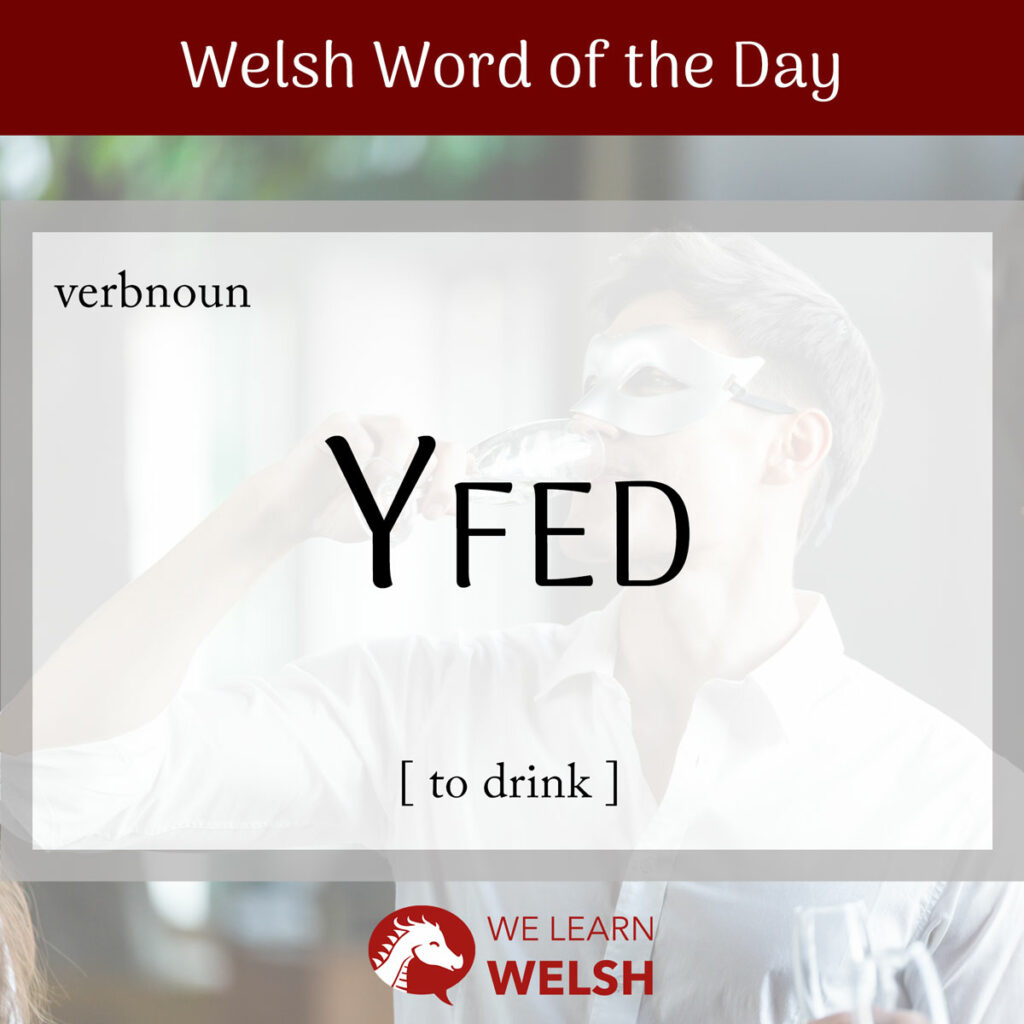The Welsh verb meaning to drink or drinking is yfed. It’s pronounced like this:
yfed
to drink
But some people in the South say this instead:
Yfed comes from the Old Welsh iben, and much, much, further back, from the proto-Indo-European root *pibeti.
There’s no evolution in meaning, with the word having always referred to the act of drinking. You can find related words for to drink in other Indo-European languages, like pi in Albanian, beber in Spanish, or pina in Hindi-Urdu.
Yfed isn’t subject to any kind of mutation. It can be affected by h-prosthesis, if preceded by eu (their) or ei (his / her) when referring to a feminine noun. This is sometimes relevant because pronouns often precede verbs in Welsh to refer to the object of the action. For example, I drank them would be rendered wnes i eu hyfed nhw – though sometimes the pronoun is dropped.
The word ein (our) also causes h-prosthesis, but you’d be hard pressed to find a context where you needed to say ein hyfed (to drink us)… maybe if you were talking about fampirod (vampires)!
Most people today treat h-prosthesis as non-obligatory and may even see it as overly formal. Also, people often drop the pronouns before verbs and may or may not then retain the mutation or h-prosthesis that the omitted pronoun would have caused.
Roedden nhw’n yfed yn llawen ac yn mwynhau’r gerddoriaeth.
They were drinking merrily and enjoying the music.
You may need to use yfed in a conjugated form. Here are some of the most commonly used conjugations:
| Future | Conditional | Past | |
| First person singular | Yfa i I will drink | Yfwn i I would drink | Yfais i I drank |
| First person plural | Yfwn ni We will drink | Yfen ni We would drink | Yfon ni We drank |
| Second person singular / informal | Yfi di You will drink | Yfet ti You would drink | Yfaist ti You drank |
| Second person plural / formal | Yfiwch chi You will drink | Yfech chi You would drink | Yfoch chi You drank |
| Third person singular | Yfith o/e/hi He/she will drink | Yfai fo/fe/hi He/she would drink | Yfodd o/e/hi He/she drank |
| Third person plural | Yfan nhw They will drink | Yfen nhw They would drink | Yfon nhw They drank |
As with almost any other Welsh verb, you can also use periphrastic conjugation. It sounds just as natural and can be easier to remember – wnes i eu hyfed nhw as above is a good example of periphrastic conjugation, whereas the ‘normally’ conjugated form would be yfais (i) nhw. The difference is that the former literally translates to I did drink them rather than I drank them, which would sound unnatural in many languages, including English.
Beth wyt ti’n yfed?
What are you drinking?
In English, we use the same word drink to refer to a drink as a noun and to drink as a verb. In Welsh, these are different.
Yfed is the verb, and it has nothing to do with the noun form, which is diod. Diod comes from a completely different proto-Indo-European root, which is *dhehy, meaning to suck. It’s a feminine noun with the plural diodydd. Though it isn’t yfed, there actually is a verbal version of diod. It’s diota, meaning specifically to drink alcohol.
Looking at it the other way around, the closest we get to a noun version of yfed would be peth yfed (drinking thing), which is sometimes used to mean alcohol. You may notice a theme emerging…
Peth yfed is quite a useful term because we don’t really have a catch-all term for alcoholic diodydd like in English. People may say diod generally when they really mean specifically something alcoholic, and cwrw (beer) and jin (gin) are also often used more widely than to refer to the particular beverages they technically describe, but peth yfed is another good one to have in the arsenal!
While yfed may not have a proper noun form, it does have a related adjective. This is yfadwy, meaning potable or safe to drink. You could also just say that something is iawn i’w yfed (okay to drink).
Sudd oren yw fy hoff ddiod, ond dim ond gyda brecwast dw i’n ei yfed.
Orange juice is my favourite drink, but I only drink it at breakfast.
Though there aren’t really any direct synonyms of yfed, there are some alternatives that you can use to provide a bit of extra description:
- llymeitio = to sip
- sipian / sipio = to sip
- llyncu / darlyncu / traflyncu = to swallow, very often used to mean to gulp down
- llowcio = to gulp down
- cobo = to gulp down
- swigio = to swig
- coffio / cwaffio = to drink deeply or greedily
- drachtio = to drink deeply or greedily
- sugno / swcian = to suck
- llempian = to slurp
- dryllian = to slurp
This is even before we get into all the different ways to talk about diota – drinking alcohol, in particular drinking a lot of alcohol.
- potio
- tancio
- goryfed
- slochian / slychian
- slotian
- hel diod / hel tafarnau (literally hunting drink / hunting pubs)
- yfed ei hochor hi (literally drinking her side)
- yfed fel ych (literally drinking like an ox)
Phew!
Ro‘n nhw’n teimlo’n sâl iawn ar ôl iddyn nhw yfed gormod o win.
They felt very sick after drinking too much wine.
To round up, let’s go over a couple of yfed-related expressions. You might not have heard of yfed yr annwyd (literally drinking the cold, but specifically cold as in the common cold), but it’s a fun idiom meaning to have a really bad cold, often implying that it’s making you quite stuffy in the trwyn (nose) or gwddf (throat).
People may also say that they are dan annwyd (under a cold), have hoedl o annwyd (a lifetime of a cold), or a suffering from swp o annwyd (a heap of a cold).
On the more familiar side, one of the very few Welsh phrases that’s well-known by many English people is iechyd da (good health), the equivalent of cheers that we say when yfed at (drinking to) someone or something. Unfortunately, non-Welsh-speakers often render it as the much less pleasant yucky-dah!


